Ever felt like you’re carrying the weight of the world on your shoulders? Long day at work, muscles screaming for mercy - we’ve all been there.
The good news is you can transport yourself to a world of relaxation and tranquility without stepping out of your home. Welcome to the magical realm of bath salts and bath soaks! But, what is the difference between bath salt and bath soak? Let’s explore this further and find the perfect solution for your relaxation needs.
Key Takeaways
- Bath salts, often containing Epsom and Dead Sea salt, offer therapeutic benefits like muscle relaxation and skin hydration, while bath soaks focus on a calming, aromatic experience with ingredients like essential oils and herbs.
- It’s crucial to choose bath salts or soaks based on your skin type; gentle, mineral-rich bath salts are ideal for sensitive skin, while hydrating bath soaks are great for dry skin.
- You can craft personalized bath salts and soaks at home with basic ingredients like Epsom salt, sea salt, essential oils, and herbs, providing a tailored bath experience with therapeutic properties.
Defining Bath Salts and Bath Soaks
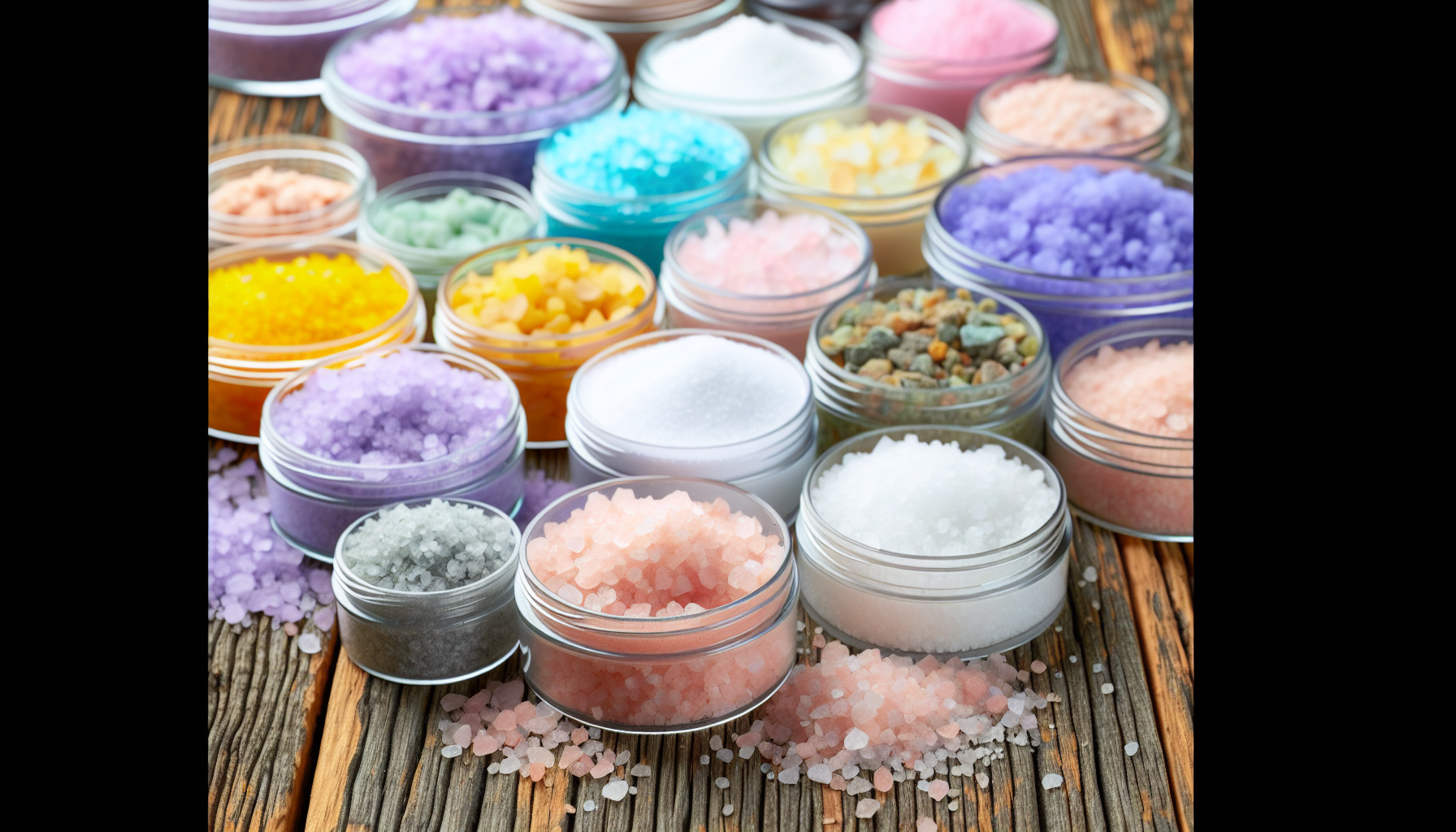
Bath salts are mineral-rich salts that dissolve in water, creating a spa-like experience right in your bathtub. They are typically infused with:
- Epsom salt
- Dead sea salt
- Fragrances
- Essential oils
This makes them perfect for unwinding after a long day.
On the other hand, bath soaks are a blend of oils, herbs, and scents, which transform an ordinary bath into a soothing and aromatic escapade. The key difference lies in their constituent elements and purposes. Bath salts, primarily mineral-based, target therapeutic benefits, whereas bath soaks aim at generating a fragrant and calming environment.
Bath Salts
Bath salts predominantly include Epsom salt, Dead Sea bath salts, and French grey bath salt. These salts are rich in minerals such as magnesium sulfate, sodium chloride, potassium, calcium, copper, zinc, and iron. Some even contain Himalayan pink salt for that extra dose of luxury. But bath salts do more than just making your bath feel like a royal affair. They can alleviate skin irritation and inflammation, making them beneficial for conditions like eczema and psoriasis.
Bath salts provide multiple health advantages, including muscle relaxation, magnesium replenishment in the body, and skin hydration. For an added touch, consider adding oats or oils for a natural exfoliating and skin-nourishing experience.
Bath Soaks
Bath soaks, on the other hand, are the epitome of indulgence. They contain a mix of ingredients like essential oils, herbs, and fragrances that make your bath supremely soothing and relaxing. Think about immersing yourself in a bath infused with seaweed or soaking in a tub filled with Dead Sea and Himalayan salts mingled with essential oils - sounds heavenly, doesn’t it?
Beyond relaxation, bath soaks incorporate skin-nourishing components like coconut oil, magnesium, minerals, olive oil, and cocoa butter, leaving your skin feeling soft, silky, and supple.
Comparing Benefits and Uses
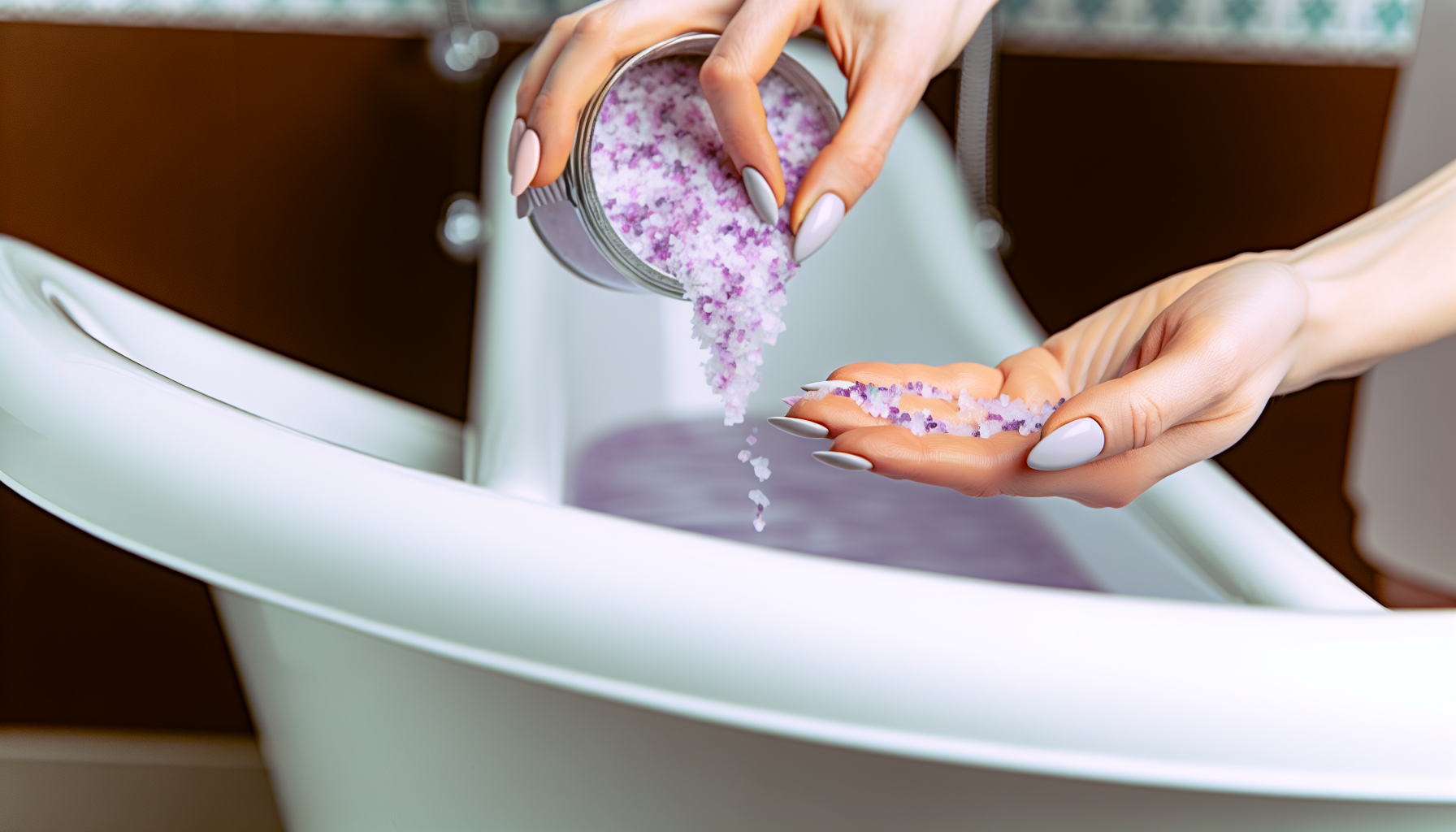
Despite seeming similar, bath salts and bath soaks offer distinct benefits and applications. Known for their health advantages, bath salts help:
- Soothe sore muscles
- Remove skin toxins
- Enhance circulation
- Boost energy
Particularly, baths with Epsom and Himalayan salts are acclaimed for enhancing immunity, promoting cellular function, improving circulation, and even controlling blood glucose levels.
Bath Salt Benefits
Bath salts are a powerhouse of benefits. They contain ingredients like Himalayan pink salt, also known as Himalayan salt, and essential oils that not only alleviate stress but also boost circulation and soothe muscles. Epsom salt, a popular ingredient in bath salts, is known for its detoxification benefits. It reduces irritation and swelling, and also eases pain.
But the goodness of bath salts doesn’t stop there. They are packed with nutrients and minerals that hydrate the skin, take care of dry skin, maintain healthy pores, and even help with calluses.
Bath Soak Benefits
Bath soaks, on the other hand, are all about aromatherapy and stress relief. Imagine a stressful day melting away as you soak in a bath infused with essential oils - sounds divine, doesn’t it?. But it’s not just about the soul-soothing scents. Bath soaks also deliver on the skincare front. They contain hydrating ingredients that leave your skin feeling smooth and nourished.
For example, the Voya Lazy Days Detoxifying Seaweed Bath is a godsend for calming and hydrating dry, easily irritated skin.
Choosing the Right Product for Your Skin Type
Knowing your skin type is key to reaping the benefits of bath salts and bath soaks. Whether you’ve got sensitive skin that’s prone to irritation or dry skin that’s always crying out for moisture, there’s a perfect bath product out there just for you.
Sensitive Skin
Sensitive skin can react adversely to harsh ingredients. Thankfully, bath salts, with their natural ingredients and gentle properties, can be a savior. They soothe irritation and inflammation, ease symptoms of eczema, hydrate the skin, and even boost skin barrier function. Products like Dr Teal’s Pure Epsom Salt Soak, Aveeno’s fragrance-free colloidal oatmeal bath soak, and Pure, natural Ancient Sea Salt are especially beneficial for sensitive skin.
Be aware that bath salts with synthetic fragrances and artificial coloring might cause irritation. Therefore, always review the ingredient list before use.
Dry Skin
Dry skin craves moisture, and bath soaks are here to quench its thirst. Bath soaks containing oils and herbs can be a boon for dry skin, providing much-needed hydration. Some popular choices for dry skin are:
- Voya Lazy Days Detoxifying Seaweed Bath
- Better Bath Better Body’s ‘Dry Skin Bath Soak’ with lavender essential oil
- Dr. Teal’s Epsom Salt Soaking Solution in lavender
These products are known for their hydrating properties and can help alleviate dry skin.
Remember, moderation is key. Over-soaking can strip your skin of its natural oils, so limit your soak time to once or twice a week.
Combining Bath Salts and Bath Soaks for Enhanced Relaxation
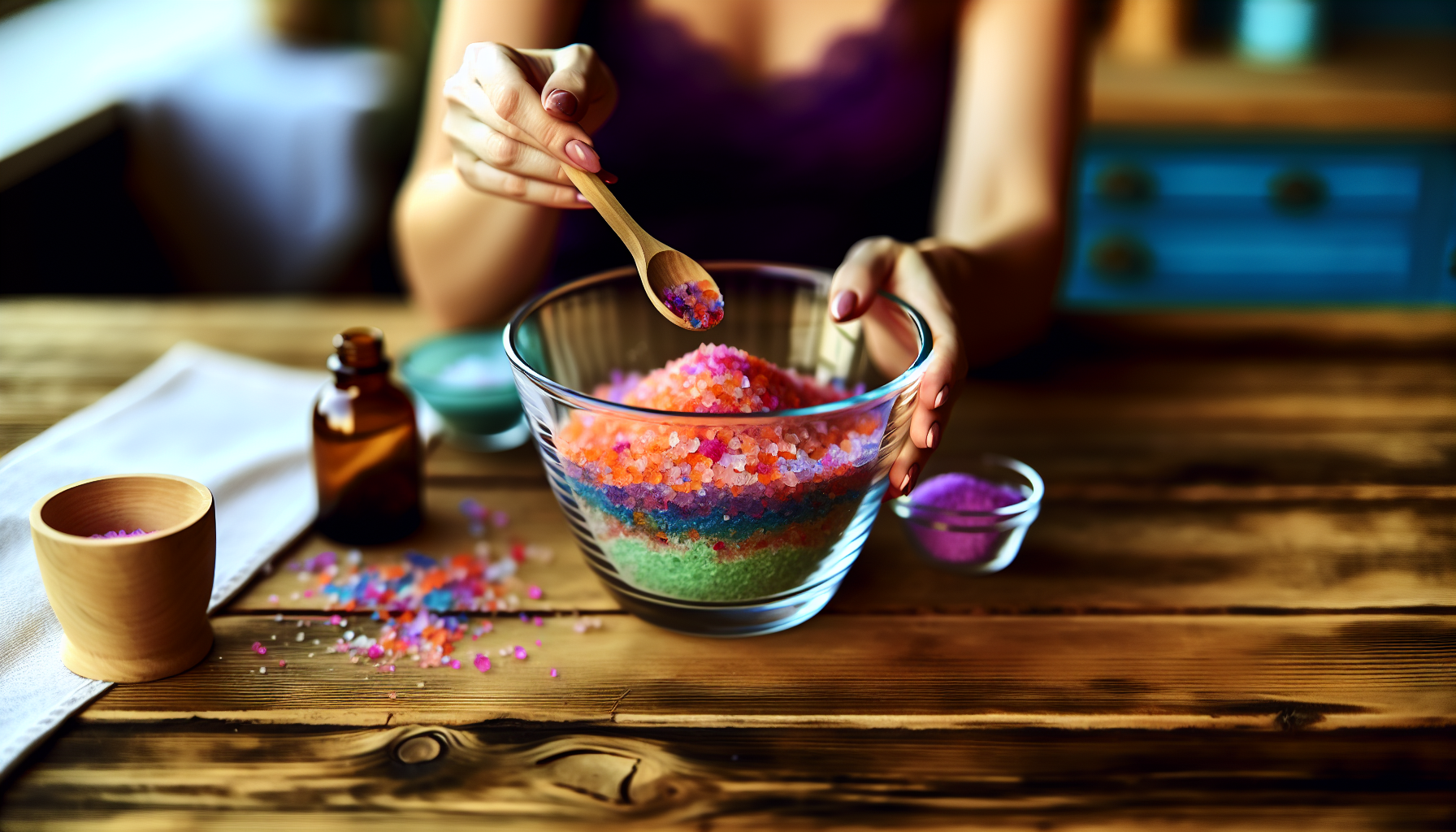
Instead of choosing, why not combine soothing bath salts, bath soaks, and a bubble bath? This blend can take your bathing experience to an unprecedented level of indulgence and relaxation.
From detoxifying your skin to filling your bathroom with soothing scents, the combination works wonders.
DIY Bath Salt and Bath Soak Recipes
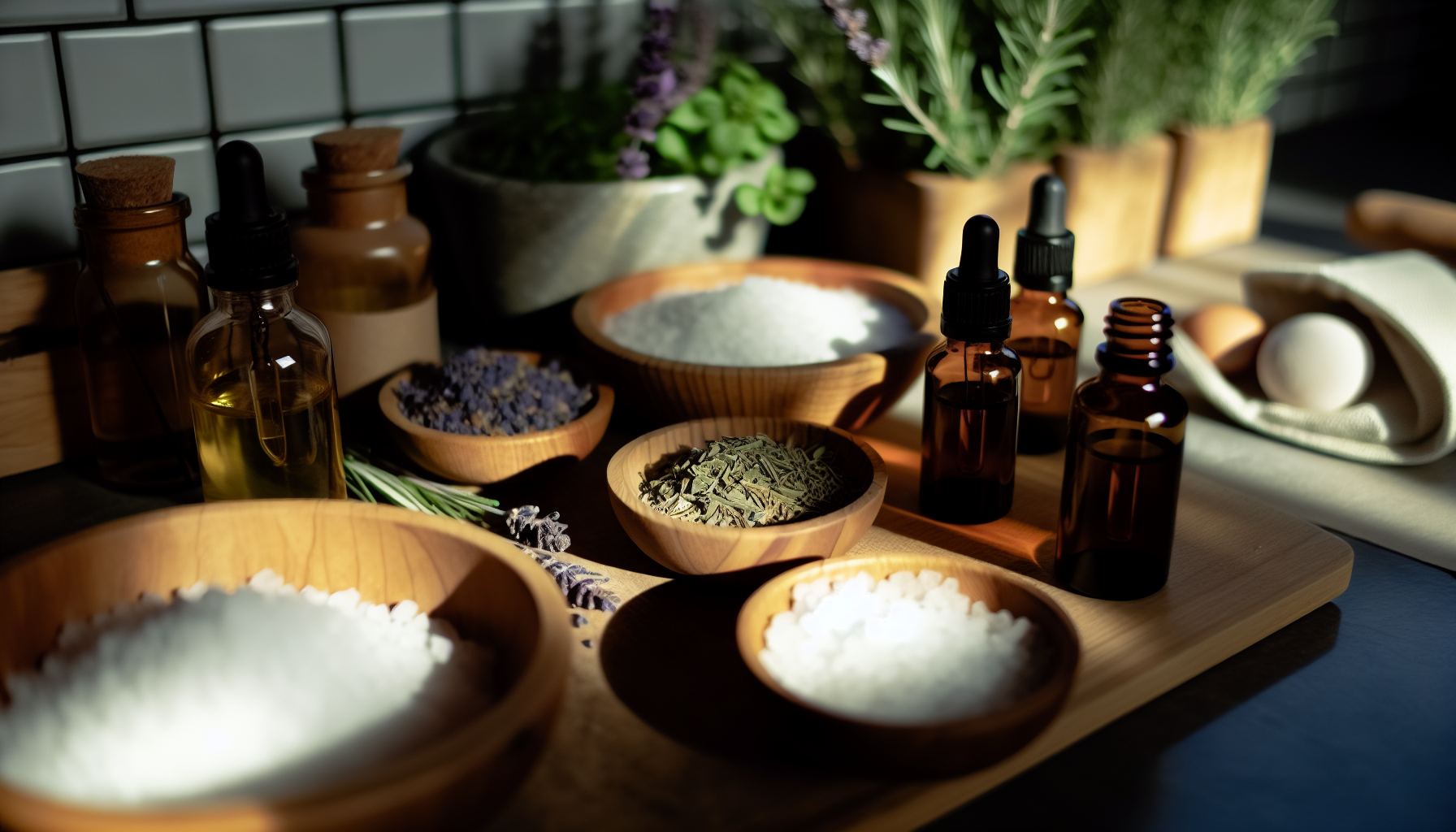
If you’re a fan of DIY or simply love to personalize your bath experience, creating your own bath salt and bath soak recipes could be a fun and rewarding endeavor.
Homemade Bath Salts
Making bath salts at home is simpler than it seems. Basic ingredients like:
- Epsom salt
- Coarse sea salt
- Optional baking soda
- Essential oils
- Food coloring
are all you need to create your personalized bath salts and benefit from their therapeutic properties.
Epsom salt, also known as epsom salts, is a preferred choice owing to its extensive health benefits, including those provided by an epsom salt bath. Sea salt also offers its unique advantages, from relaxing your muscles to enhancing blood flow.
Homemade Bath Soaks
Homemade bath soaks give you the freedom to experiment with a variety of ingredients, such as:
- Epsom salt
- Sea salt
- Baking soda
- Essential oils
- Dead sea salt
- Lavender essential oil
- Chamomile
- Carrier oils
- Oatmeal
- Fresh and dried herbs
- Organic essential oils
A simple mix of these ingredients, adding just a few drops of your favorite essential oil, and voila! You have your own customized bath soak ready.
How to Use Bath Salts and Bath Soaks Effectively
To maximize the benefits of your bath salts and soaks, correct usage is key. For bath salts, add them to warm bath water while the tub fills, making sure they dissolve thoroughly. Ideally, a soak of at least 20 minutes is recommended for complete therapeutic benefits.
Conversely, bath soaks can be directly added to the tub, used as a scrub, or massaged onto damp skin. A 12-minute soak is recommended for optimal benefits, but restrict your soak to 10 minutes in warm water if you have sensitive skin.
Popular Bath Salt and Bath Soak Products
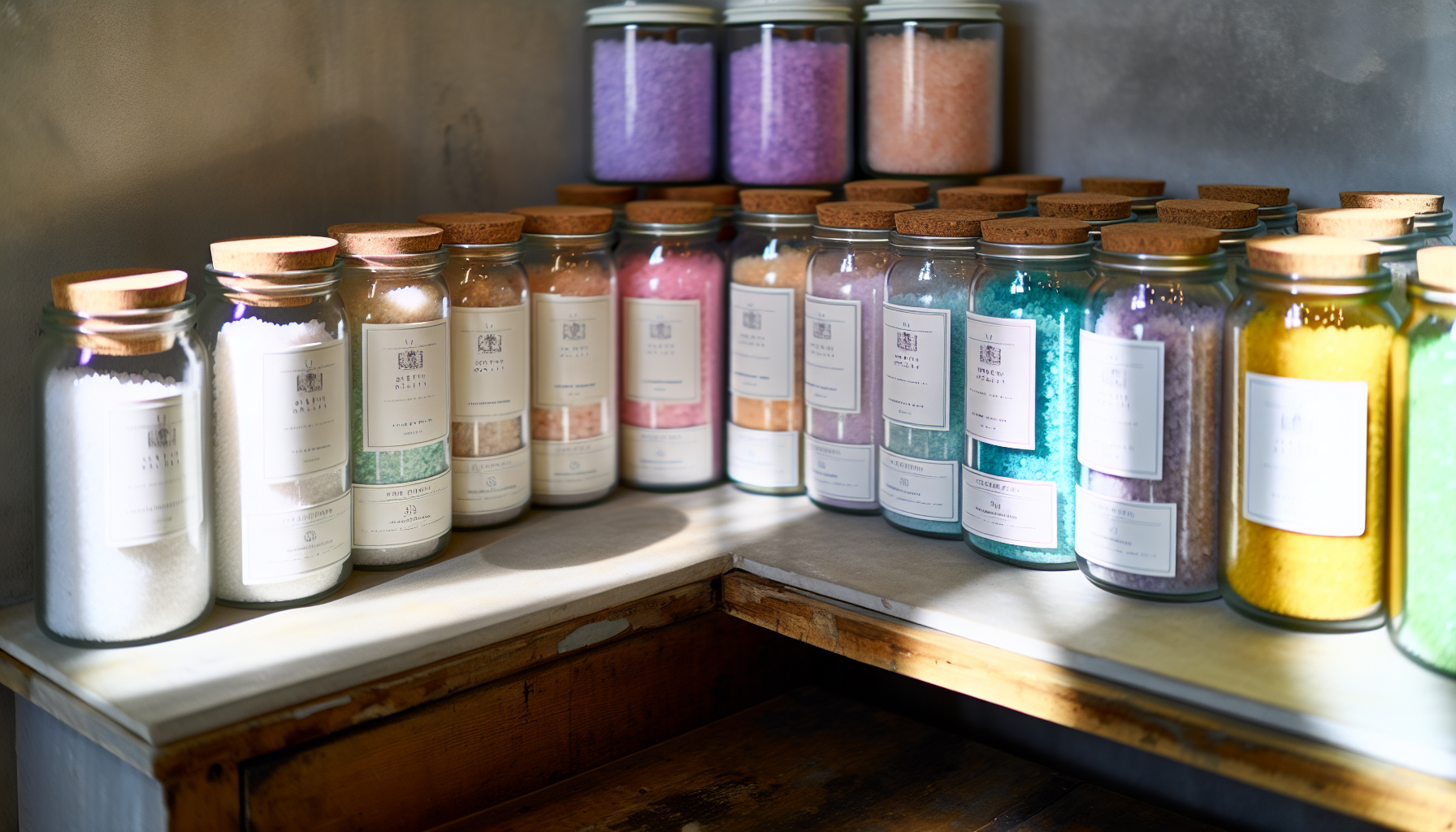
Bath salts and soaks have gained immense popularity, and the market is flooded with a wide range of products. Each product boasts unique features and benefits, catering to different tastes and needs. Some popular options include:
- Dove Glowing Care Foaming Bath Salts: Offers a sweet and nutty mango and almond scent.
- Naturopathica Sweet Birch Magnesium Bath Flakes: Stands out with their therapeutic blend of magnesium and sweet birch oil.
- Degree Maximum Recovery Epsom Salt Muscle Soak: Perfect for those post-workout relaxation sessions.
Safety Precautions and Potential Allergies
Despite the myriad benefits of bath salts and soaks, safe usage is paramount. Allergic reactions can vary from mild skin irritation to severe symptoms like hives and skin infections. Certain ingredients, including methylenedioxypyrovalerone (MDPV) and even natural elements in bath bombs, can instigate skin sensitivity. Always conduct a patch test before using a new product, and seek advice from a doctor or pharmacist if you have sensitive skin or known allergies. Safety should always be a priority!
Soak for the right amount of time, hydrate after your bath, and avoid consuming Epsom salt.
Summary
Whether it’s the mineral-rich bath salts or the aromatic bath soaks, there’s no denying that these products can transform your bath into a spa-like retreat. They offer an array of benefits, from soothing sore muscles to hydrating dry skin. While the market offers a wide range of options, you can always DIY your way to personalized bath salts and soaks. So why not turn your next bath into a therapeutic indulgence?
Frequently Asked Questions
What is bath soak used for?
Bath soaks are used to lower stress, improve circulation, relax the body, and ease muscles, benefiting both the mind and the body. Soaking in a bath with bath salts can be a potent de-stressing mix.
What does bathing with bath salts do?
Bathing with bath salts can soothe tired muscles, rejuvenate the body, hydrate and detoxify the skin, and aid sleep and relaxation. Additionally, they provide a great way for the body to absorb minerals, particularly beneficial for those with a magnesium deficiency.
Is it good to soak in a salt bath?
Yes, soaking in a salt bath can help relieve stress, ease achy muscles, and treat irritated skin. It's a great way to pamper yourself and extend the benefits to your skin, muscles, and joints.
Do you rinse after soaking in bath salts?
Yes, it's recommended to rinse off excess salt by taking a cool shower after soaking in bath salts. Pat your skin dry after. Enjoy your bath!
How are bath salts different from bath soaks?
Bath salts offer therapeutic benefits due to their mineral content, while bath soaks are primarily meant to create a fragrant and relaxing environment. So, if you're looking for physical benefits, go for bath salts, and if you want a relaxing experience, opt for bath soaks!
You Might Also Like...










